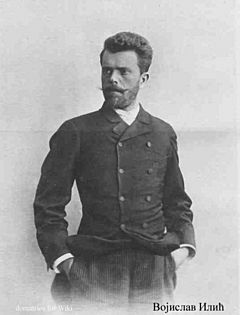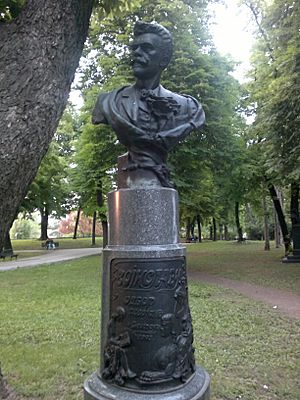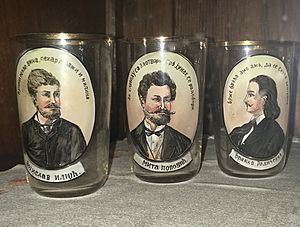Vojislav Ilić facts for kids
Quick facts for kids
Vojislav Ilić
|
|
|---|---|
 |
|
| Born | 14 April 1860 Belgrade, Principality of Serbia |
| Died | 21 January 1894 (aged 33) Belgrade, Kingdom of Serbia |
| Resting place | Belgrade New Cemetery |
| Occupation | Poet |
Vojislav Ilić (in Serbian Cyrillic: Војислав Илић; born April 14, 1860 – died January 21, 1894) was a famous Serbian poet. He was known for his beautiful and detailed poems.
Vojislav Ilić did not finish his college studies. He had to work in different office jobs that were not very important. He often lived in poor conditions. Even so, he wrote many poems. He quickly became the most important Serbian poet in the late 1800s. Like many artists from that time in Serbia, he passed away young. He died from a lung disease called tuberculosis in 1894.
His poems are a great example of modern Serbian language. They often show themes popular at the time, like harsh nature. This could be a cold wind blowing over empty fields. They also sometimes mentioned old historical times, like the period of Emperor Elagabalus.
Biography
Vojislav Ilić was born in Belgrade on April 14, 1860. He was the youngest son of a poet and politician named Jovan Ilić. His family on both sides was from the well-off middle class in the countryside. They were not nobles. His father became quite wealthy after he stopped working for the government in 1882. He then lived a quiet life, leading a family that loved literature.
Jovan Ilić, along with politicians Jevrem Grujić and Milovan Janković, played a key role in a big meeting in 1858. This meeting was called the St. Andrew Day National Assembly. Here, people first openly supported the idea of a parliament to check the power of Prince Alexander Karađorđević.
Vojislav went to various schools. After finishing high school, he joined the Faculty of Philosophy at Belgrade's Grande école (Velika Škola). However, he did not graduate. His home was a center for writers. There, he became friends with famous poets like Jovan Jovanović Zmaj and Đura Jakšić. He even married one of Jakšić's daughters.
Vojislav's writing style changed through four main European literary periods in less than 15 years. This was very unusual. But his great skill as a poet was that he moved beyond the styles of his teachers. Literary critic Jovan Skerlić said that Vojislav paid a lot of attention to how poems were made and their structure.
In 1885, Vojislav joined the Serbian Army as a volunteer. He went with his group to Bulgaria during the Serbo-Bulgarian War. But he did not fight in any battles. This short war led Ilić in a different direction than the military. From 1887 to 1892, he worked as an editor at the Government Printing Press. In 1892, he taught at a Serbian school in Turnu Severin, Romania. That same year, he became a press secretary at the Ministry of Internal Affairs. Later, he worked as a vice-consul in Priština, which was then under Turkish rule.
Literary Work

His first book was simply called Pesme (Poems). It was published in Belgrade in 1887. After that, he published more books of poems. As a poet, he quickly became known as one of the most skilled writers of his time. His influence spread widely. Young poets who wanted to write gathered around him. During this time, the word Vojislavism became a common term in Serbian literature.
In the 1890s, Vojislavism was very popular among young Serbian poets. It is no surprise that Jovan Skerlić and other critics called him "the greatest Serbian poet." Some of the best-known Serbian poets who admired him were Milorad Mitrović, Mileta Jakšić, Aleksa Šantić, and Danica Marković. Even Jovan Dučić followed his style for a short time. Dučić later moved on to a new literary style. This new style was adopted by Dučić and Milan Rakić, who were influenced by French poets. Dučić and Rakić gained this independence partly from their studies and travels abroad. Both worked in the diplomatic service. Dučić once said, "Even if Vojislav did not become our greatest poet, he is certainly our most beautiful poet."
Critics say that Vojislav Ilić was a big admirer of Alexander Pushkin. They noted that everything in Ilić's poems, like their rhythm and strong expression, reminded them of Pushkin. Jovan Skerlić criticized him for this. However, Ilić never hid it. He openly said in one of his poems that he was a student of Vasily Zhukovsky and Pushkin.
Ilić also strongly supported the language reforms of Vuk Karadžić.
Death and Legacy
Vojislav Ilić died from tuberculosis on January 21, 1894. He was only 33 years old. He is remembered for influencing many poets who came after him. His work helped lead to even greater achievements in Serbian poetry in the early 1900s. His poems have remained important over time. Several collections of his Collected Works have been published since his death. One was in 1907 and another in 1909, in two volumes.
Jovan Skerlić wrote about Ilić: "What Lukijan Mušicki meant to Serbian literature in the 1830s, Sima Milutinović Sarajlija in the 1840s, Đura Jakšić and Jovan Jovanović Zmaj in the 1860s, Vojislav J. Ilić made his mark in the 1890s. He brought the Romantic period to an end and started a new direction – Vojislavism."
He is included in a list called The 100 most prominent Serbs.


